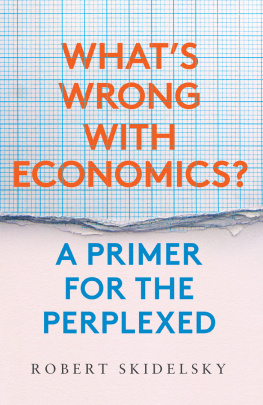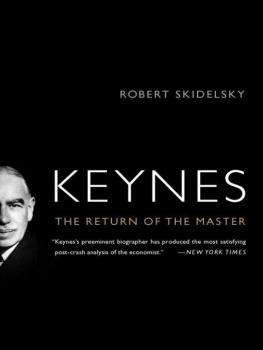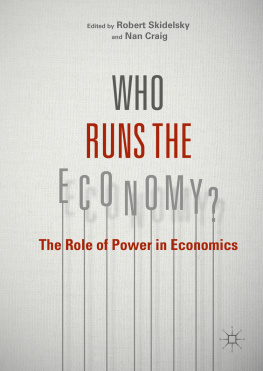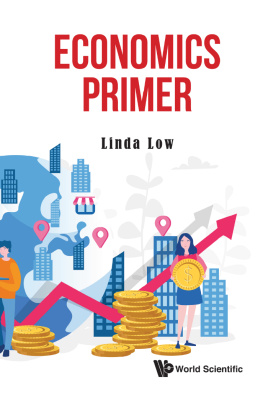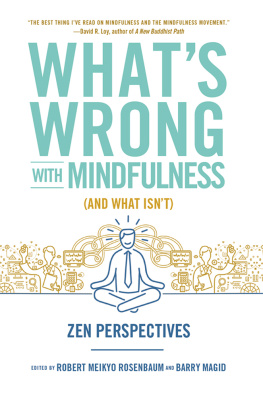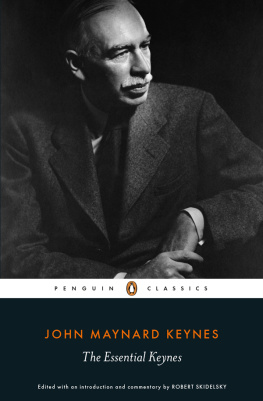Robert Skidelsky - Whats Wrong with Economics?: A Primer for the Perplexed
Here you can read online Robert Skidelsky - Whats Wrong with Economics?: A Primer for the Perplexed full text of the book (entire story) in english for free. Download pdf and epub, get meaning, cover and reviews about this ebook. year: 2020, publisher: Yale University Press, genre: Politics. Description of the work, (preface) as well as reviews are available. Best literature library LitArk.com created for fans of good reading and offers a wide selection of genres:
Romance novel
Science fiction
Adventure
Detective
Science
History
Home and family
Prose
Art
Politics
Computer
Non-fiction
Religion
Business
Children
Humor
Choose a favorite category and find really read worthwhile books. Enjoy immersion in the world of imagination, feel the emotions of the characters or learn something new for yourself, make an fascinating discovery.
- Book:Whats Wrong with Economics?: A Primer for the Perplexed
- Author:
- Publisher:Yale University Press
- Genre:
- Year:2020
- Rating:4 / 5
- Favourites:Add to favourites
- Your mark:
- 80
- 1
- 2
- 3
- 4
- 5
Whats Wrong with Economics?: A Primer for the Perplexed: summary, description and annotation
We offer to read an annotation, description, summary or preface (depends on what the author of the book "Whats Wrong with Economics?: A Primer for the Perplexed" wrote himself). If you haven't found the necessary information about the book — write in the comments, we will try to find it.
Whats Wrong with Economics?: A Primer for the Perplexed — read online for free the complete book (whole text) full work
Below is the text of the book, divided by pages. System saving the place of the last page read, allows you to conveniently read the book "Whats Wrong with Economics?: A Primer for the Perplexed" online for free, without having to search again every time where you left off. Put a bookmark, and you can go to the page where you finished reading at any time.
Font size:
Interval:
Bookmark:
WHATS WRONG WITH ECONOMICS?

Copyright 2020 Robert Skidelsky
All rights reserved. This book may not be reproduced in whole or in part, in any form (beyond that copying permitted by Sections 107 and 108 of the U.S. Copyright Law and except by reviewers for the public press) without written permission from the publishers.
For information about this and other Yale University Press publications, please contact:
U.S. Office:
Europe Office:
Set in Minion Pro by IDSUK (DataConnection) Ltd
Printed in Great Britain by TJ International Ltd, Padstow, Cornwall
Library of Congress Control Number: 2019956878
ISBN 978-0-300-24987-3
A catalogue record for this book is available from the British Library.
10 9 8 7 6 5 4 3 2 1
To students and teachers of economics
CONTENTS
FIGURES
PREFACE
Many students want to study economics to learn how to make the world better. They soon discover that studying economics is studying what economists do. The question is whether what economists do is fit for purpose. This book tries to address this question.
The question arises because of the complicity of mainstream economics in much of what has gone wrong with economic life in the last thirty years, starting with the dismantling of labour protections and proceeding, via the explosion of inequality, to the crash of the global financial system in 20072008. Free competition was set loose to run, like a huge untrained monster, its wayward course, indifferent to the fate of humanity. This quotation from Alfred Marshalls Principles of Economics is an apt depiction of what was allowed to happen in our own times.
Anyone with a historical sense would have realised that the hubristic attempt to make the world into a frontier- and culture- free single market would end in tears. But to the dominant tendency in economics, market-led globalisation has been a kind of coming of age, when humankind, for the first time in history, shed its irrational resistance to unlimited buying and selling. I was led to ponder the state of mind of a profession which could offer such a prospectus and call it progress. Moreover, I became convinced that the tendency to unleash the market was inherent in economics from its earliest times: mainstream economics today is largely a return to the roots. The more I thought about it the more I became convinced that the cardinal fault of economics lies not in specific doctrines, but the methods it uses to reach its conclusions.
What I hope to provide is an insight into the mind of the economist, into a style of thinking about economic behaviour which is characteristic of economists. I am not claiming that all economists think like this. It is a model which aims to explain salient features of the way economists think. What I found in the mind of the economist is a picture of the human being as a utility maximiser. To economists, coherent purposes and reliable calculations of the consequences of action are the magic keys which unlock the secrets of human behaviour. This conception of homo economicus underpins their policy advice: individuals will respond to interventions in a predictable way. The reason their advice is so often wrong is that their picture of human motives is incomplete. Quite simply, it leaves out all the motives for choice and action which fall outside the calculus of behaviour they have set up. As a consequence it fails to predict many outcomes accurately.
The main target of my attack is neoclassical or marginalist or mainstream economics (I use the terms interchangeably) because this has been so dominant in the textbooks and gives a distinctive flavour to the way all economics is done today. I distinguish it from classical economics which was a much broader church than its neoclassical successor, both in its view of what social matter consists of and in its view of how knowledge is attained. Neoclassical economics narrowed the discipline considerably by claiming that only individuals really exist organisations are simply constructions of individuals and that their rationality makes their behaviour predictable. I call this mainstream, because ever since Lionel Robbins defined the neoclassical position in a famous essay of 1932, it has been dominant in the profession. My own critical stance necessarily brings out the weaknesses rather than strengths of this method: but in view of its extravagant claims to knowledge, it is the weaknesses not strengths which need exposing. The great strength of economics lies in its power of generalisation; its weakness is to generalise from over-simple premises. It is this flaw which will be the focus of my attack.
Neoclassical economics claims to be more like physics than any other social science does, able to make hard predictions. In its own estimation, this gives it unique authority. To which one may reply: you can put on the uniform of a policeman but that does not give you the authority of a policeman. The uniform of economics is very impressive. It is replete with models, equations, regressions, statistics: the claims to authority we associate with science, and whose absence condemns studies like sociology and politics to the status of inferior, in other words palpably non-authoritative, musings. How has economics managed to pull off a feat of authority which has eluded all the other social sciences? Because it is undoubtedly the most influential of them, the discipline to which governments and administrators pay greatest homage.
No small part of the answer, as we shall see, lies in the magic of numbers. It is the ability to attach numbers to mathematical symbols which gives economics its unique selling power. It enables economists to make quantitative predictions. No other social science counts and measures its material so energetically. Many eminent economists have complained of the overuse of maths in economics, but few have explained clearly that this overuse is inherent in its restriction of economic behaviour to what can be measured. No one would have much interest in mathematical models of the economy unless they could be resolved into quantities of people and things.
As I tell it, mathematical language must be seen as part of the art of persuasion, not of demonstration, because economists cannot demonstrate the truth of what they are saying, only persuade you to see the world as they do.
An easy, and to some extent valid, attack on the way I depict neoclassical economics is to say that it is caricature. Some readers may feel that I distort what goes on in the mind of the economist. But it is the caricature which rules the textbooks. The method of stating a hypothesis in a silly form (Paul Krugmans phrase) and then relaxing the assumptions to bring it into closer touch with reality exerts a gravitational pull towards over-simple reasoning. And it is the toy models which often pass for gospel among financial journalists, business lobbyists, and politicians. Abstracting from money in the toy model, and then adding it into the more complicated model, is a good example of a method which failed to understand the crucial role of the financial system as mover and shaker in the events leading up to the crash of 2008. The toy models exclude the all-pervasive influence of power and uncertainty in shaping outcomes.
Another criticism would be that my account ignores developments in the mainstream since the 1980s. The crash of the global economy in 2008 was undoubtedly a shock, and it led to genuine soul-searching. Behavioural economics has been its main fruit so far; and beside behavioural economics, there have been hundreds of papers in the specialist journals explaining how cascades, crashes, and fads can happen. All this is to be welcomed, if only as a belated discovery of behaviours which have long been obvious to non-economists. My criticism of these new approaches to realism is that they start life crippled by the attempt to render them consistent with a method which has as its root the
Next pageFont size:
Interval:
Bookmark:
Similar books «Whats Wrong with Economics?: A Primer for the Perplexed»
Look at similar books to Whats Wrong with Economics?: A Primer for the Perplexed. We have selected literature similar in name and meaning in the hope of providing readers with more options to find new, interesting, not yet read works.
Discussion, reviews of the book Whats Wrong with Economics?: A Primer for the Perplexed and just readers' own opinions. Leave your comments, write what you think about the work, its meaning or the main characters. Specify what exactly you liked and what you didn't like, and why you think so.

